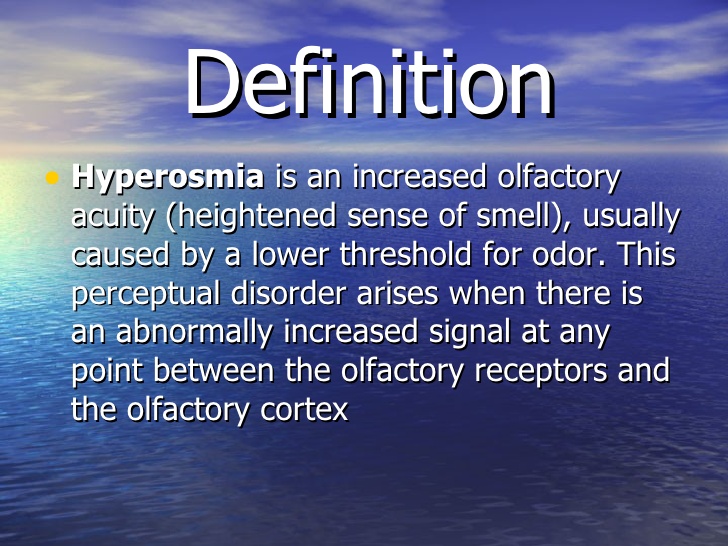Can you imagine what it would be like to feel sweat or excrement much more intensely?It’s a real pain in the ass, isn’t it? This is what happens to people with hyperosmia on a daily basis.
It’s a disorder characterized by an exaggerated ability to feel that others don’t even realize it.
- These people may.
- For example.
- Smell a lily or jasmine among a pile of rubbish.
- Or recognize the smell of a very distant person.
- But this does not mean that they become hunting dogs or who have superhuman abilities.
- But have developed hypersensitivity and a unique olfactory ability.
This olfactory capacity has as many advantages as unpleasant consequences for those who enjoy it and suffer, for some, in general terms, this is considered a blessing, while for others it ends up being a great suffering.
Here are some examples
If we are at the door of the house and perceive an appetizing smell of food or cake prepared by one of our neighbors, it is normal that we have a voracious appetite. I want to eat that!?
On the one hand, if we have food at home or if the neighbor is our friend, that is an advantage, but on the other hand, if the element that causes the smell so intensely and continuously is not so appetizing or if we cannot satisfy the desire awakened (hunger), things change.
Right now, standing at the door of the house, quietly relaxed after a long day of work, we get all kinds of smells without us being able to do anything to avoid it: the fat you wear in your shoes (and it’s upstairs), a bath smell, the dog on the ground floor or oil on a burnt stove.
And it happens every day, anytime. All we’d like to do is live with a preacher to cover our nose.
This pathology is found in the same dimension, although at another extreme, of two other types of perception disorders related to smell: hyposmia, decreased olfactory sensitivity, and anosmia, total absence of smell.
Of the three, hyperosmia is the rarest, so it is a little studied disease, it is precisely its low incidence in the population that has not allowed to know more certainly the causes that produce it.
For example, it is known that there are certain diagnoses or risk factors associated with it, such as menopause, Addison’s disease, hyperthyroidism, or neural changes from amphetamine use or withdrawal syndrome.
In some cases, this condition eventually goes away on its own: it only appears for a period of time and only in extreme cases lasts a lifetime.
For a perfumer or sommelier, having hyperosmia is a real advantage, it is the case of the protagonist of the novel and film of the same name, “The Perfume: The Story of a Murderer”, for whom his hyper olfactory perception has allowed him to be one of the best in his profession, however, for the rest of the people, this can become a real agony.
This disorder causes very serious problems in social contexts, due to the degree of rejection and dislike caused by certain smells, for example, it begins to consider your favorite food as something disgusting or your favorite perfume as unbearable.
The person may also pass out if they are in very crowded spaces or with a large crowd of people, such as on a bus or subway.
Because it cannot be determined safely, treatments or ways to improve hyperosmia also offer conflicting results.
For example, some dopamine antagonists have been used to treat this disorder, inhibiting these neurotransmitters limits the amount of odors that reach the olfactory bulb.
From the testimony of the people who suffer from it we know that smoking also decreases their olfactory capacity, but beware!It is necessary to treat this claim very carefully, because if there is one thing that already has enough scientific evidence is that smoking does not improve the health of anyone, rather quite the opposite.
So, without a doubt, the first thing to do, both for people with this disorder and for those around them, is to avoid or eliminate strong smells, which can become really unbearable, these can be foods such as fish, meat, certain sauces or even coffee. The absence of drug treatment gives no choice but non-exposure.
Interestingly, several women with this type of “passenger” are pregnant. Therefore, at the beginning and end of pregnancy, they have olfactory hypersensitivity mainly due to increased concentration of estrogen and progesterone in the blood.
This leads the woman to have a more vivid smell, which can feel the rejection of certain smells that were previously pleasant to her, or on the contrary; and can make you vomit more often when you notice really unpleasant smells.
In some pregnant women, this change disappears or disappears after the first trimester; in others, it persists throughout the gestation period and disappears more gradually after delivery.
It is possible that this physiological change was inherited from our ancestors, so that the mother was able to recognize the smell of her own baby at birth.
Dysosmia is a neurological disorder that causes a change in the sense of smell, which can manifest as anosmia (as mentioned above), parosmia or ghost.
The smell of frying, however caloric, does not satisfy the appetite, so more scientific research is needed on these types of disorders and, in particular, on hyperosmia, to lessen its impact on the lives of those with it, is essential to determine why and how it appears.

